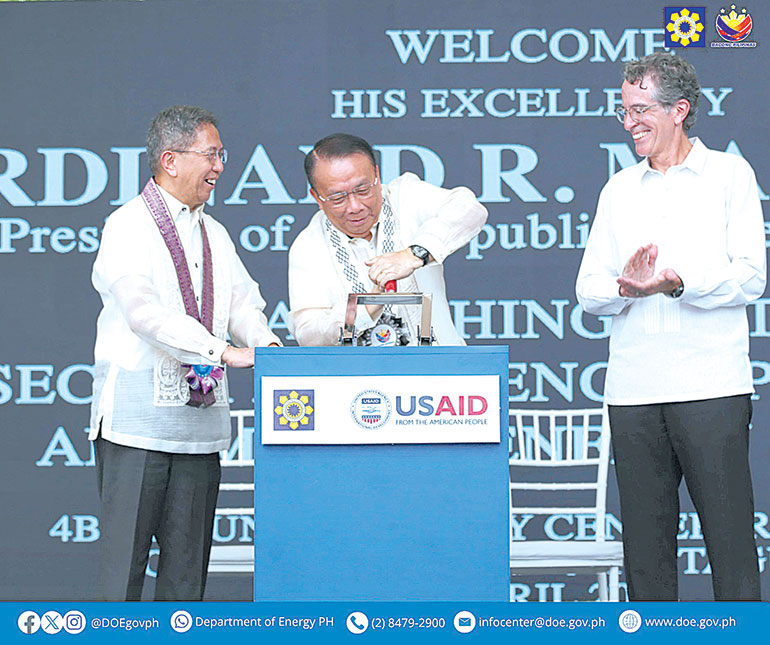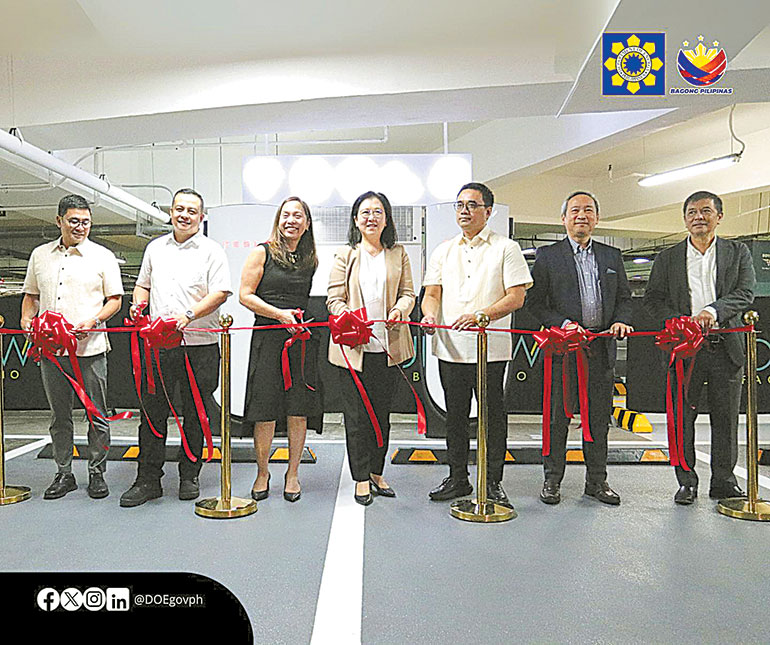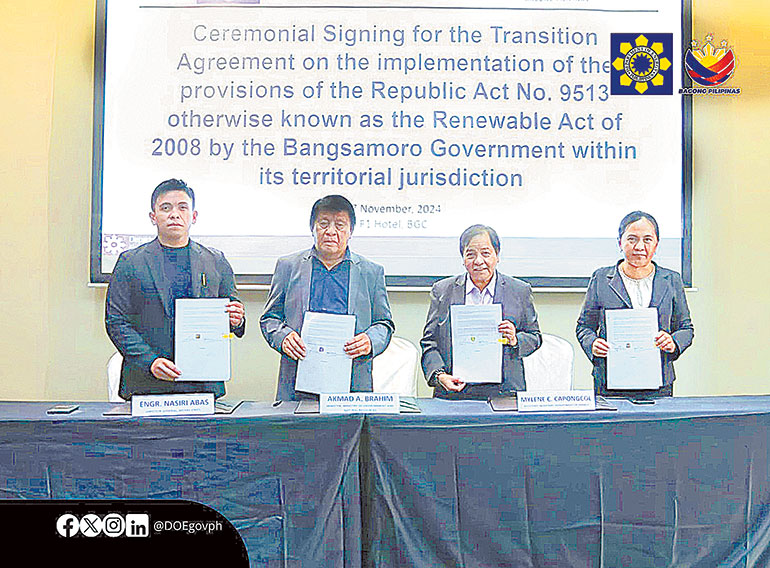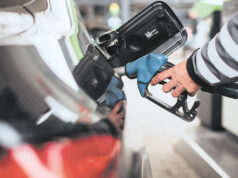A shining beacon in the pursuit of renewable energy

Energy lies at the heart of development. As such, energy security is perhaps the most crucial issue the world is facing today. As countries strive to eliminate poverty, secure affordable food, water, and shelter for all, alongside other targets stipulated in the United Nations Sustainable Development Goals, making the transition towards clean and renewable energy (RE) is crucial.
In light of this need that the Department of Energy (DoE) celebrates the Philippines’ remarkable ascent in the 2024 Climatescope Report by energy research organization BloombergNEF, where the country now ranks as the second most attractive emerging market for renewable energy investments.
This achievement, a leap from fourth place in 2023 and a staggering climb from 20th place in 2021, signifies the international community’s growing trust in the Philippines’ dedication to a clean energy transition and sustainable development.
This recognition highlights the impact of the government’s forward-thinking renewable energy policies. Anchored by mechanisms like renewable energy auctions, net metering schemes, generous tax incentives, and an ambitious clean energy target of 35% in the power mix by 2030, the Philippines stands as a trailblazer in the Asia-Pacific region. As the only emerging market in the region with such comprehensive strategies, the country is creating a blueprint for sustainable energy progress that others can follow.
But the journey is far from over. Peak electricity demand is projected to grow at an annual rate of 5.3% from 2024 to 2028, which intensifies the race to ramp up renewable energy capacity in the country. As of April this year, the country still needs 53 gigawatts (GW) to reach its 2040 RE capacity goal, almost seven times the current capacity of 8,264 megawatts.
Meeting these energy demands to support the country’s dynamic and expanding economy necessitates not only continued innovation but also a collective push to accelerate clean energy projects nationwide.
One of the most significant developments regarding this lies in the recent landmark reforms permitting 100% foreign ownership of renewable energy ventures. There is only so much capital available in the country, so opening doors to greater foreign investments in solar, wind, and hydropower can allow the country to further strengthen its position as a magnet for clean energy capital.

“The administration of President Ferdinand Marcos, Jr. reaffirms its commitment to driving renewable energy development, fostering innovation, and creating an enabling environment for both local and international investors,” the DoE said in a statement.
“The government will continue to harness the immense potential of the country’s natural resources to fuel inclusive economic growth and a greener, more sustainable future for the generations to come.”
Moving forward in energy sustainability
The Philippines’ current position as a beacon of opportunity in the renewable energy sector has long been in the making. Since the Renewable Energy Act of 2008, which accelerated the exploration and development of renewable energy resources in the country, the DoE has been resolutely pursuing sustainability as a solution to energy security.
In recent months alone, the DoE has launched initiatives that included promoting energy efficiency, expanding renewable energy capacity, and enhancing the resilience of energy infrastructure to natural disasters.
This month, the department announced the fifth round of the Green Energy Auction (GEA-5), exclusively dedicated to offshore wind projects, scheduled for the third quarter of 2025. This auction aims to become another major leap towards bolstering offshore wind power generation by 2028. The GEA is a major cornerstone of the Philippine Energy Plan 2023-2050, exemplifying the government’s commitment to renewable energy deployment, and the energy transition agenda.
There is also the recently concluded Energy Efficiency Excellence (EEE) Awards, held to honor public and private institutions for their exemplary performance in optimizing energy management and integrating energy efficiency into their operations. This year, the awards ceremony received a record-breaking 562 entries from various sectors of the economy, reflecting heightened awareness of energy efficiency as a crucial element of sustainable development. According to the DoE, this year’s awardees collectively achieved energy savings of 15 gigawatt-hours, resulting in cost reductions of more than P172 million and avoidance of 10,000 tons of carbon dioxide emissions.

These awards signify the government’s willingness to collaborate with the private sector to further the country’s energy agenda, not just locally, but abroad.
During a formal visit in November, the President signed a Memorandum of Understanding on Energy Transition Cooperation with President Mohammed bin Zayed Al Nahyan of the United Arab Emirates (UAE). The key agreement laid out several areas of collaboration particularly renewable energy; liquefied natural gas as a transition fuel; power generation, transmission and distribution system; nuclear energy; energy efficiency and conservation; and alternative fuels and emerging technologies.
By driving investments in energy infrastructure, the partnership seeks to create new jobs, foster local expertise through technology transfer and capacity-building programs, and lay the foundation for a resilient energy ecosystem. With a focus on five key areas, this initiative aims to ensure that advancements benefit all sectors of society, promoting a more equitable distribution of resources and opportunities for sustainable growth.

Combining UAE’s expertise in innovative energy solutions and the Philippines’ commitment to energy security and sustainability holds transformative potential, and the key agreement seeks to become another critical step towards uplifting the lives of millions of Filipinos.
Another landmark agreement is one with the Ministry of Environment, Natural Resources, and Energy (MENRE) of the Bangsamoro Autonomous Region in Muslim Mindanao (BARMM) to advance renewable energy development in the region.
Last November, Energy Secretary Raphael P.M. Lotilla and MENRE Minister Akmad A. Brahim signed a Transition Agreement to ensure the seamless implementation of Republic Act No. 9513, or the Renewable Energy Act of 2008, within BARMM. The agreement affirms the collaboration between the national and Bangsamoro governments, facilitating the orderly transfer of authority over the administration, application, and development of renewable energy projects in the region.
As stipulated in Section 8, Article XIII of the Bangsamoro Organic Law, the Bangsamoro Government holds the right to explore, develop, and utilize natural resources, including renewable energy sources within its jurisdiction. Inland waters serving as energy sources beyond BARMM, meanwhile, are co-managed by the BARMM and the national government.
The DoE-Renewable Energy Management Bureau (DoE-REMB) will continue to assist MENRE by providing training and technical guidance on renewable energy policy and operations. This includes frameworks for processing and awarding service and operating contracts, ensuring a robust foundation for MENRE’s assumption of responsibilities.
“Through DoE-REMB, we commit our full assistance to MENRE to facilitate its full assumption of the powers, functions, and responsibilities delegated to the DoE under the Renewable Energy Act, including those powers, functions, and responsibilities pertaining to the REMB, and other regulations that applies to the BARMM,” Mr. Lotilla said.
“By working hand-in-hand and providing full assistance to MENRE, we are committed to ensuring that the Bangsamoro Government has the necessary support, resources, and expertise to successfully implement renewable energy policies and initiatives in the region. This partnership will not only help drive the development of renewable energy projects but also create long-term benefits for the region, along with improved energy access, environmental sustainability, and economic growth,” the Secretary added.

The transition represents a significant milestone in BARMM’s self-governance journey. By the end of the year, or at a later mutually agreed date, MENRE will take full custody of all data and administrative responsibilities over renewable energy projects in the region. Following the handover, MENRE will oversee renewable energy service and operating contracts, aligning them with BARMM’s unique policies and priorities.
Minister Brahim expressed optimism about the collaboration, emphasizing its potential to transform BARMM’s energy landscape. MENRE’s stewardship will focus on fostering sustainable energy development, improving energy access, and contributing to environmental preservation and regional economic growth.
Through the agreement, BARMM will play a key role in the Philippines’ renewable energy agenda, ensuring inclusive and sustainable development, not only for the Bangsamoro region but for the entire country.
For 52 years, the DoE has played a pivotal role in shaping the Philippines’ energy landscape, navigating through periods of political change, economic challenges, and technological advancements to support the nation’s progress. Now, as it moves into this most critical period of national development, it faces its toughest challenges yet. To ensure sustainable, stable, secure, sufficient, accessible and affordable energy for all Filipinos, there is still much work to be done. — Bjorn Biel M. Beltran



